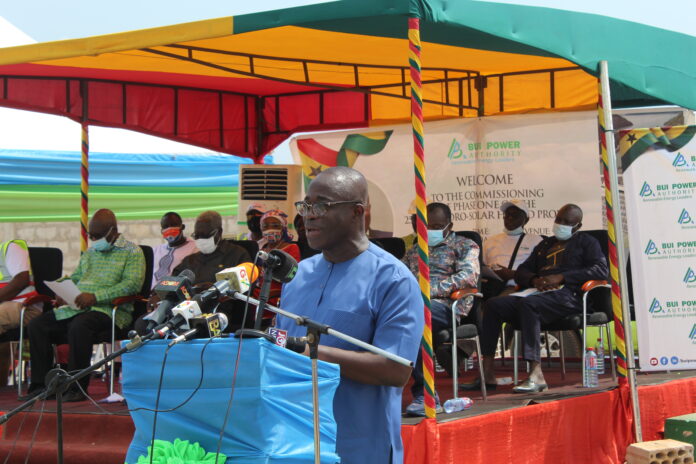Ghana’s Deputy Minister for Energy in charge of Power, William Owuraku Aidoo says the decision by the Ministry to review all the thermal and Renewable Energy Power Purchasing Agreement signed under the immediate past NDC administration has paid off.
According to him, that bold decision taken by the Ministry has resulted in the reduction of Feed -in-Tariff for solar power plant from 18 U.S cent per kilowatt hour to below 10 U.S cent per kilowatt hour.
Other steps the Ministry took which saved the power sector, the Minister explained was placing moratorium on the signing of new Power Purchasing Agreement and a directive that procurement of all energy contracts by the Government of Ghana and state-owned entities be done through competitive bidding on Take-and-Pay basis.
“These interventions have helped sanitise the power sector. The result is what we are seeing today. Whereas state-owned generation companies, ie. VRA and BPA, having gone through competitive bidding have been able to bring down the cost of solar below 10 US cents per kilowatt hour. Previously, the IPPs sold this same solar power to the distribution utilities at a Feed-in-Tariff of above 18 US cents per kilowatt hour,” he explained.
Speaking at the commissioning of the first phase of the 250MWp solar park being executed by the Bui Power Authority (BPA), Owuraku Aidoo noted that the Ministry of Energy facilitated the expeditious amendment of the Renewable Energy Act 2011 to repeal the feed-in-tariff scheme to provide the legal backing for competitive procurement of power.
Ghana: VRA Seeks To Become Electric Vehicle Leaders In Future
The Renewable Energy Amendment Act 2020 also encourages small-scale self-generation and net-metering from renewables.
Furthermore, it mandates fossil fuel-based wholesale electricity suppliers, fossil fuel producers and other companies that contribute to greenhouse gas emissions to complement the global effort of climate change mitigation by investing in non-utility scale renewable energy technologies, particularly for off-grid electrification.
According to the Minister, when all the 250MW solar capacity is completed, it would be the largest Hydro-Solar-Hybrid Power Generating Plant in Africa.
He said the objective of the Hydro-Solar-Hybrid is to enable the Bui Generation Station operate solar during the day when the sun is shining and bring the hydro power on line when the solar irradiation is low especially during the night.
He applauded the CEO and Board of the Bui Power Authority for finding innovative way of executing this project without loans, as well as constructing the first-ever Floating Solar PV System of 1MW in the West African sub-region on the Bui reservoir in Ghana.
“Looking at the successes that have been achieved within this short period, you will agree with me that the Bui Power Authority has distinguished itself as Ghana’s Renewable Energy leaders and this cannot go unrecognised. Consequently, Parliament, on 6th November, 2020, amended the Bui Power Authority Act and expanded its scope beyond the Black Volta to implement renewable and other clean energy alternatives nationwide,” the Deputy Minister said.
















